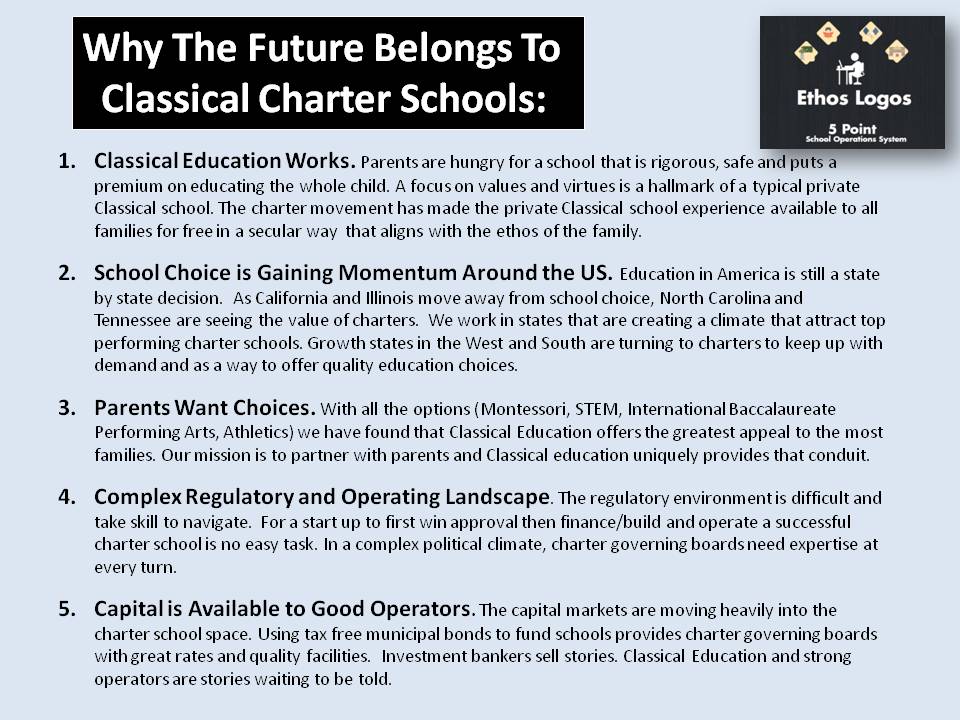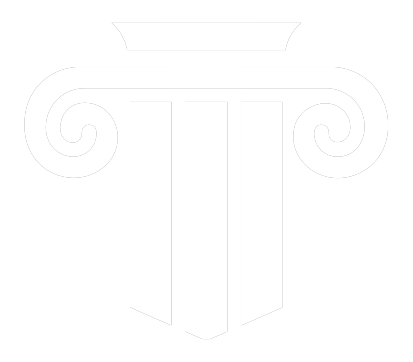Classical Ed
Classical Education is a time-tested education model that helps scholars learn how to learn.
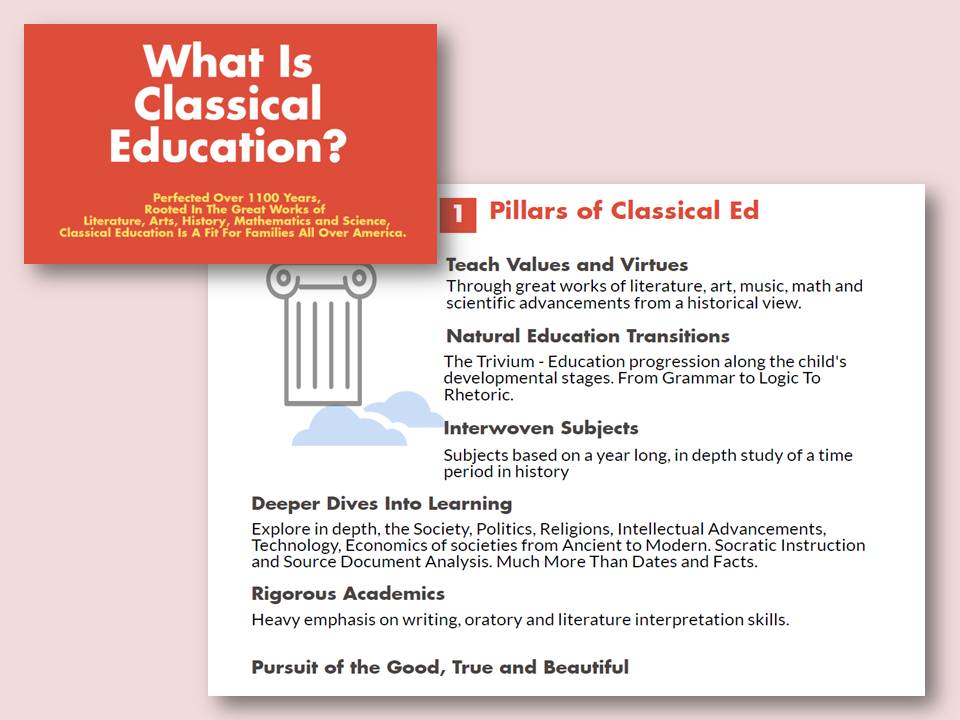
- Imagine a citizenry who understands history so well they are committed to not repeating mistakes of the past.
- Imagine citizens who can approach the ideas of the day and forgo the emotion of the moment and apply reason, recognize logical fallacies, and not be swayed.
- Imagine a citizen who can articulate their ideas and beliefs and be able to communicate in writing and face to face in a way that is respectful but persuasive.
- Imagine a citizen who has the moral underpinnings handed down from generation to generation of what it truly means to do right from wrong, even when no one is looking.
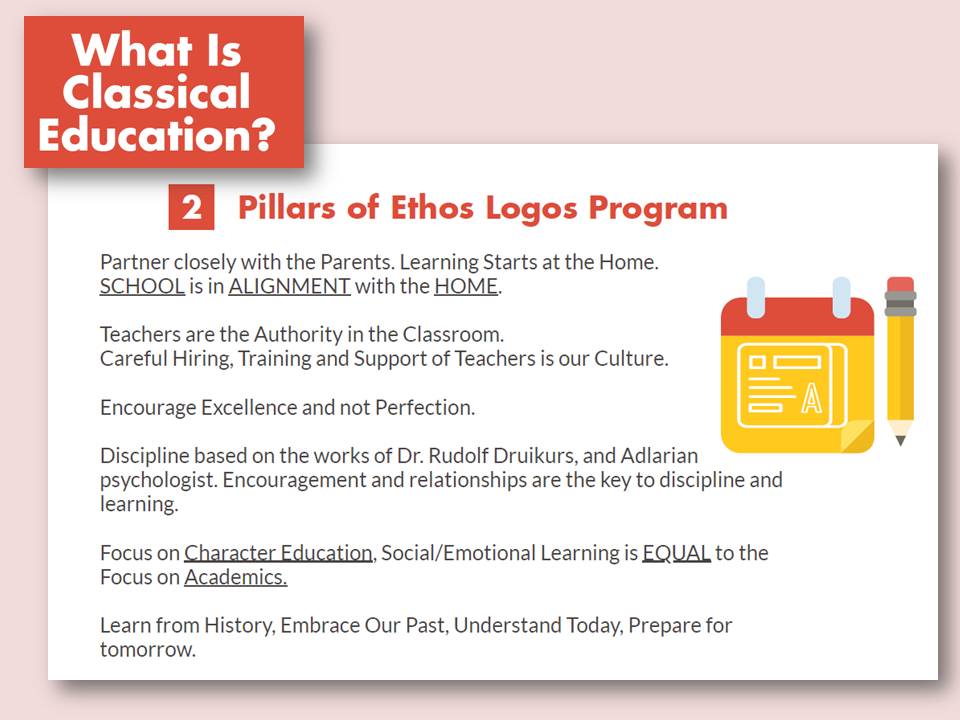
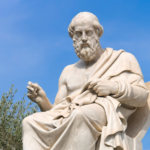 Classical education focuses on learning styles, content, and approaches that are attuned to students’ needs while traditional education often uses convenience and “social norms” as guidelines.
Classical education focuses on learning styles, content, and approaches that are attuned to students’ needs while traditional education often uses convenience and “social norms” as guidelines.
An Ethos Logos supported Classical School is built on the ideas of the three stages of learning development known as the Trivium. Grammar, logic, and rhetoric were essential to classical education and introduced to us through Plato’s dialogs.
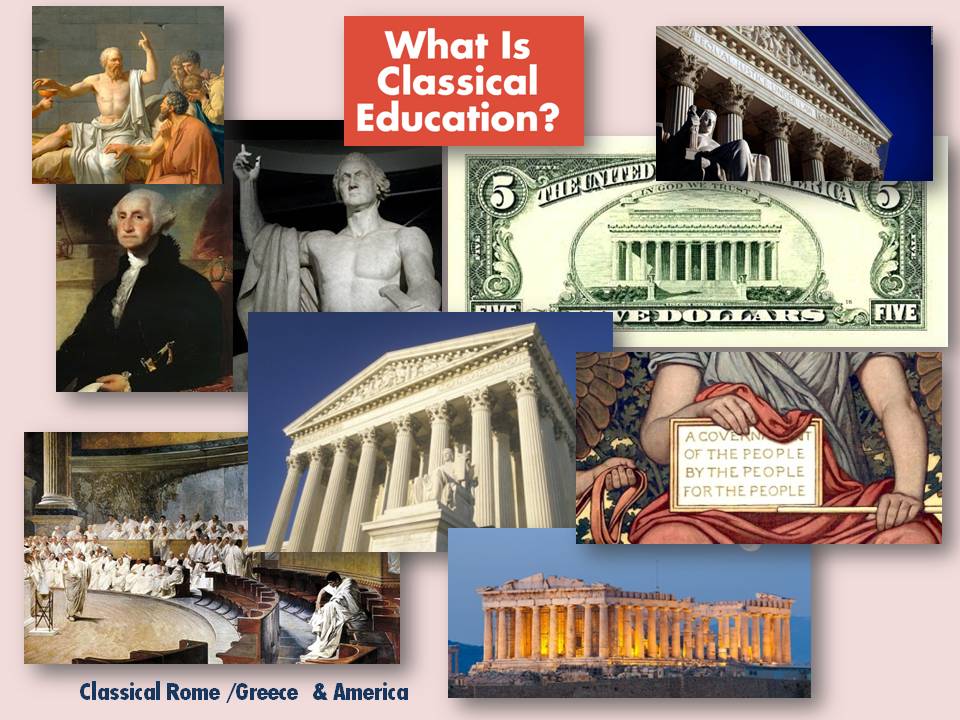
The middle ages saw a resurgence in the ancient Greek traditions and Classical Education brought back the ideas of the learning ‘Academy’. The original Academy was founded by Plato in c. 387 BC in Athens. Aristotle studied there for twenty years before founding his own school, the Lyceum. Plato (l. c. 428-348 BCE) was a student of Socrates (l. c. 469/470-399 BCE) and Aristotle studied under Plato. Aristotle was the teacher of Alexander The Great who went on to conquer the known world in the 320’s BC. Alexander carried Aristotle’s philosophies and embedded them when he conquered the Persian Empire. Aristotle’s works spread throughout the known world of ancient antiquities. The power of these ideas ended up influencing other philosophies and providing a foundation for the development of Jewish, Christian, and Muslim theology.
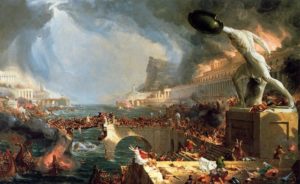 After the fall of Rome and through the early dark ages, the ideas of the Hellenic times remained dormant while Catholicism dominated government, kingdoms, and the Western world. It wasn’t until the 1200s and then with the invention of the Guttenberg printing press, on to the reforms of Martin Luther and then to the Renaissance and founding of America that classical ideas came back to life. Ideas from ancient thinkers morphed and refined into the foundation of Western society. The focus of "classical education" has been used in Western culture for several centuries, and each time period tweaking and adding its own selection of topics. By the end of the 18th century, in addition to the trivium and quadrivium of the Middle Ages, the definition of a classical education embraced the study of literature, poetry, drama, philosophy, history, art, and languages.
After the fall of Rome and through the early dark ages, the ideas of the Hellenic times remained dormant while Catholicism dominated government, kingdoms, and the Western world. It wasn’t until the 1200s and then with the invention of the Guttenberg printing press, on to the reforms of Martin Luther and then to the Renaissance and founding of America that classical ideas came back to life. Ideas from ancient thinkers morphed and refined into the foundation of Western society. The focus of "classical education" has been used in Western culture for several centuries, and each time period tweaking and adding its own selection of topics. By the end of the 18th century, in addition to the trivium and quadrivium of the Middle Ages, the definition of a classical education embraced the study of literature, poetry, drama, philosophy, history, art, and languages.
In modern times, Mortimer Adler, an American Philosopher, and educator along with Robert Maynard Hutchins established the Great Books Foundation in 1947, after many years of leading Great Books seminars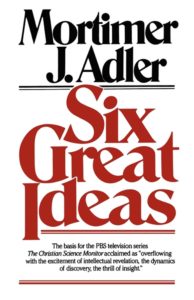 at the University of Chicago. Their purpose was to expand opportunities for people to read and talk about the significant works of the Western intellectual tradition. To help explore, interpret, and evaluate the complex and challenging ideas in these works, the Great Books Foundation developed a discussion method known as Shared Inquiry™. Many of the Foundation’s reading and discussion programs and publications for grades K–12, colleges, and adult book groups are based on this method.
at the University of Chicago. Their purpose was to expand opportunities for people to read and talk about the significant works of the Western intellectual tradition. To help explore, interpret, and evaluate the complex and challenging ideas in these works, the Great Books Foundation developed a discussion method known as Shared Inquiry™. Many of the Foundation’s reading and discussion programs and publications for grades K–12, colleges, and adult book groups are based on this method.
Shared Inquiry promotes an intellectually stimulating interpretative discussion of work—a group exploration of meaning that leads to engaging and insightful conversation. It helps participants read actively, articulate probing questions about the ideas in a work, and listen and respond effectively to each other. And it is based on the conviction that participants can gain a deeper understanding of a text when they work together and are prompted by a leader’s skilled questioning.
Today, Classical Education is predominantly found in private schools and is very popular with home school families. The charter school movement has opened a door to make secular Classical Education more readily available to communities all over America. Ethos Logos singular goal is to help Classical Schools open and operate at the best of their ability. We believe that the future of our country and the future of our families will benefit from the academic rigor, values, and virtues instruction and integration of the arts to the core subjects.
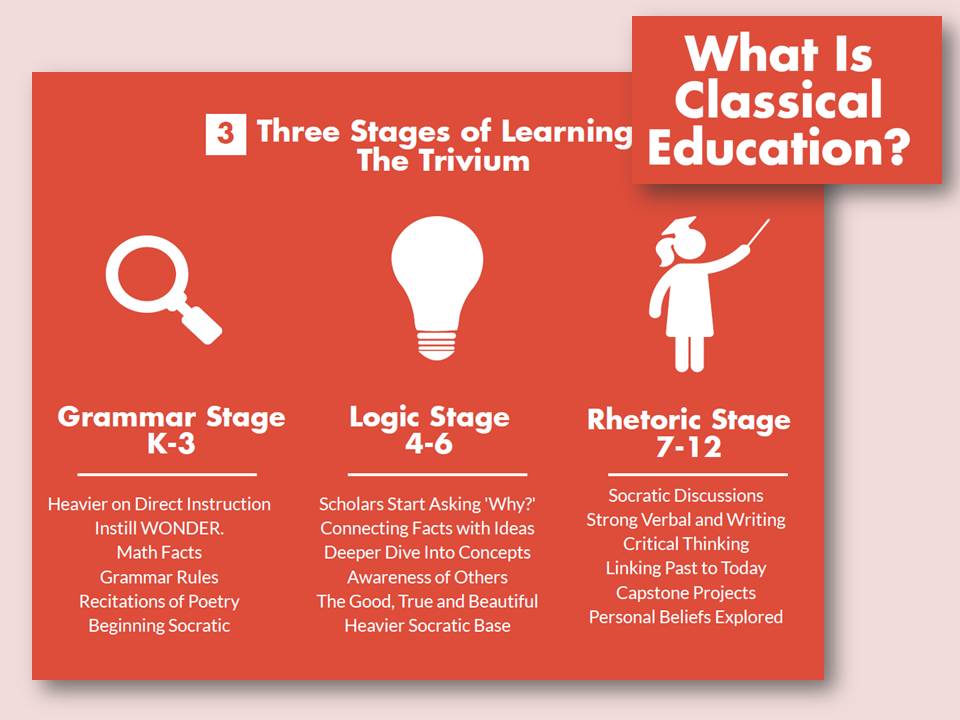
The Trivium can be viewed as a focus on particular subjects and the interweaving of those subjects on a time period and an approach to natural patterns of student learning.

There are three phases of learning;
Grammar Stage of Learning
Scholars are developmentally ready to increase their speaking and reading skills. The Grammar stages are marked by foundational mastery of foundational facts and rules. There is an emphasis on vocabulary expansion, grammar rules, math facts, and science basics such as cell structures (1st grade) and on to the periodic table by 3rd grade.
History is introduced in the ancient worlds through modern in the 1st to 4th grades. There is a focus on primary documents and what it was really like in a time period. The canons of western literature are lined up to the time period the scholars are studying so there is a complete immersion into the time period of history being studied.
The great artist and composers are introduced with historical context and a deeper understanding of what makes the great masters of the arts, Good True, and Beautiful.
Elementary age - Concrete thinkers; information sponges; memorization comes naturally.
Latin Language – The study of Latin is introduced in an engaging way through story and an introduction of the time period when the language was dominant in the world. Latin helps to build learning skills, develop an understanding of English skills and vocabulary.
Grammar is the stage where we instill a love of learning and teach scholars to THINK
Logic Stage of Learning
Marked by kids are becoming much more argumentative. Scholars want to know how and why. In this stage, we look for activities where students gain a deep understanding of what they are learning. This may include comparing and contrasting or deep research into a particular topic. We introduce the scholars to formal logic and the art of debate. Scholars will write from the perspective of historical or literary figures. We teach the student HOW to write. The basics of story outlines, themes, finished work, and presentations. The ability to communicate ideas in a persuasive and respectful manner is the main skill we are looking for scholars to develop.
The Logic stage involves developing and mastering sound reasoning and critical thinking skills; with emphasis on comprehension within the context and application of an idea.
Junior High age - Beginning to think deeper through asking of ‘why’; Building upon the foundations of the Grammar stage with growth of reasoning and analytical thinking abilities
The Logic stage is where we teach the student to REASON
Rhetoric Stage of Learning
The Rhetoric stage takes the tools learned in the Grammar Stage and the understanding of the subject learned in the Logic Stage, but now we are asking the scholars to synthesize, analyze and form their own opinion on a subject. This is the stage where students are becoming independent, forming their own opinion, and separating from their families. We are preparing these scholars for college, careers, and families beyond yours. Rhetoric scholars are becoming masters of communication skills. Building on the Logic arguments, the students take formal Rhetoric which focuses on an emphasis on expression, articulation, and application of their ideas.
High School age – Scholars are developing the ability to be abstract thinkers. We encourage interest in self-expression, communication, and creativity.
Rhetoric - The study of the effective use of language in speech and writing
The Rhetoric stage is teaching the student to PERSUADE
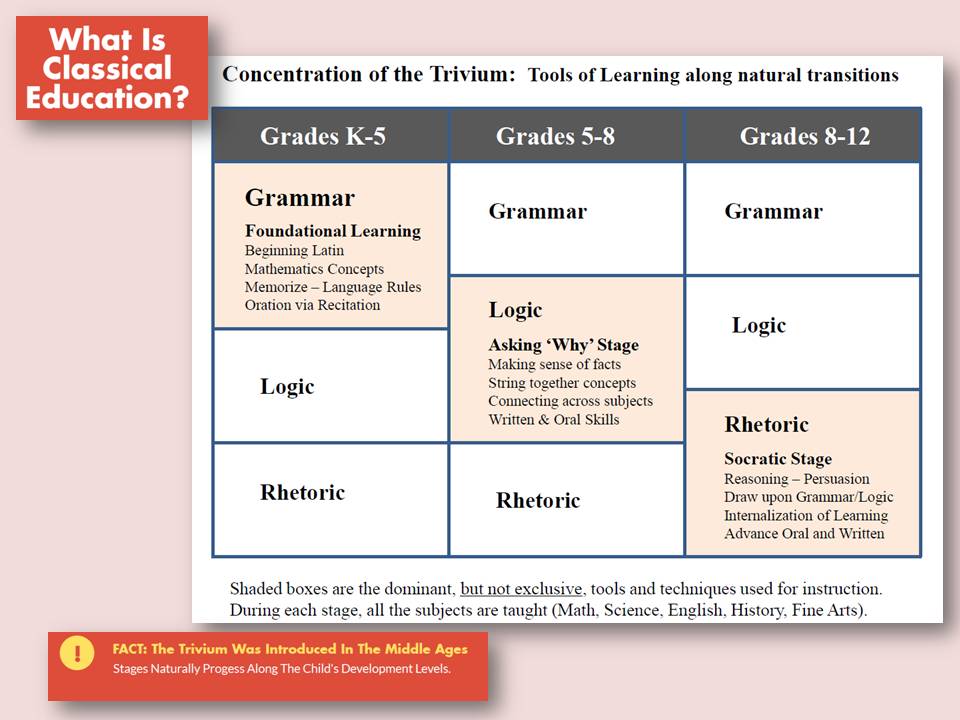
Classical education is a conscious return to the ancient goal of education: teaching children to think and learn for themselves. Throughout their time in a Classical system, like ours, there is a constant reminder and focus on the Good True, and Beautiful. This manifest is an appreciation of the arts, great literature, ideas, and positive or negative consequences of the past.
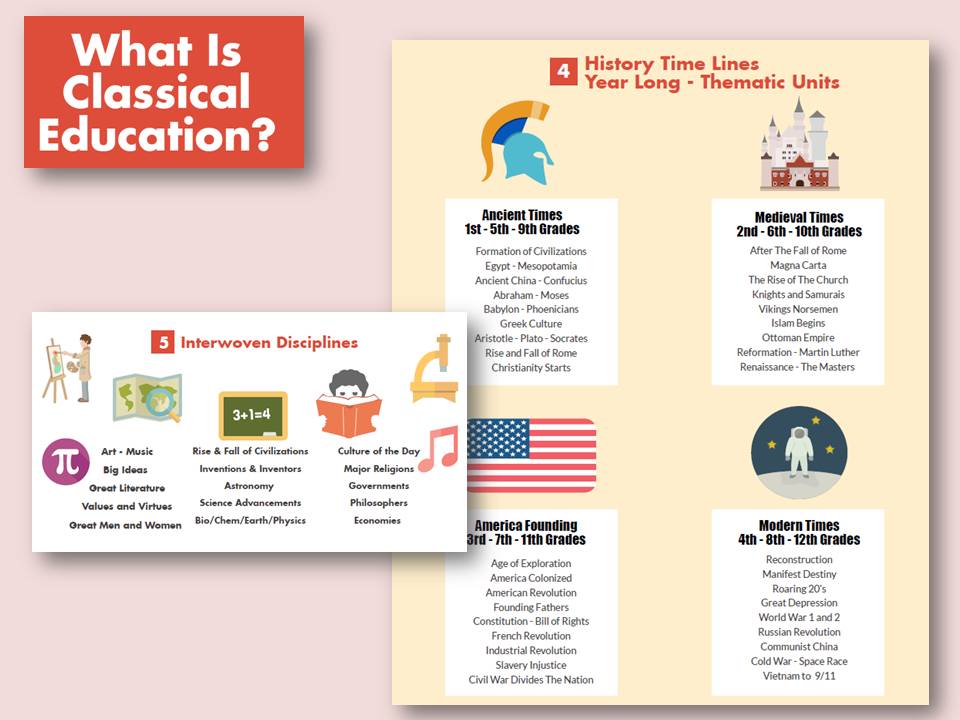
Classical education has a dual-track focus on academics and moral teachings. Through the power of the story, scholars are exposed to the big debates that have occurred in society for thousands of years.
What does it mean to be a good citizen?
How do my actions affect others?
What virtues are needed to excel in society?
What does it mean to pursue the Good, True and Beautiful?
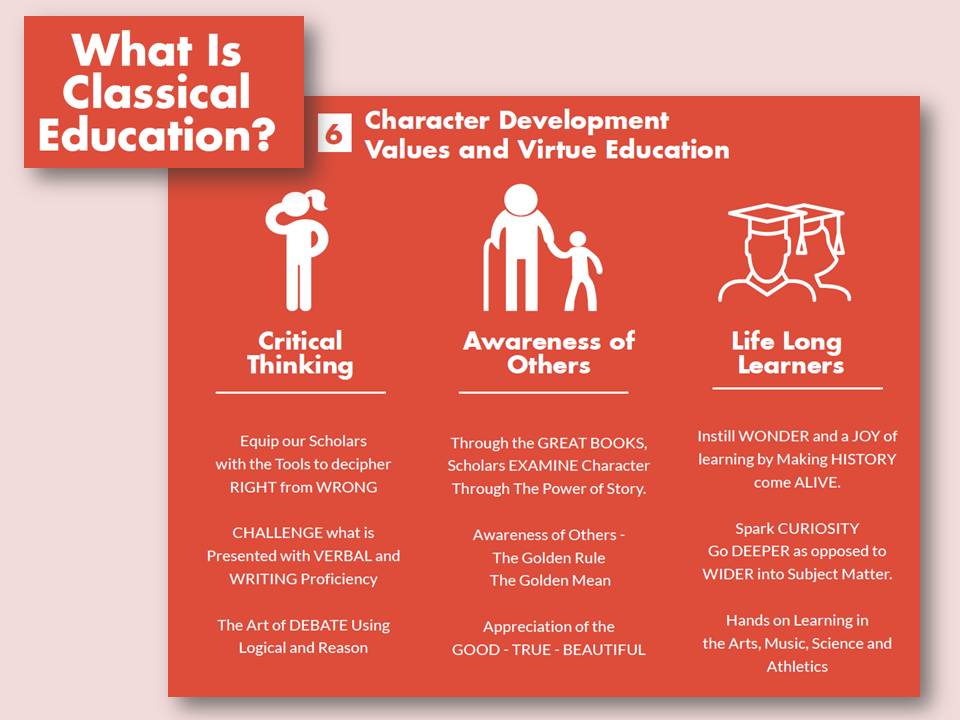
Classical Education and The Charter Movement
A most recent report from the National Association of Charter School Authorizers reviewed 3000 applications for charter in 20 states and found that Classical Education charters are one of the top models being authorized in the US.
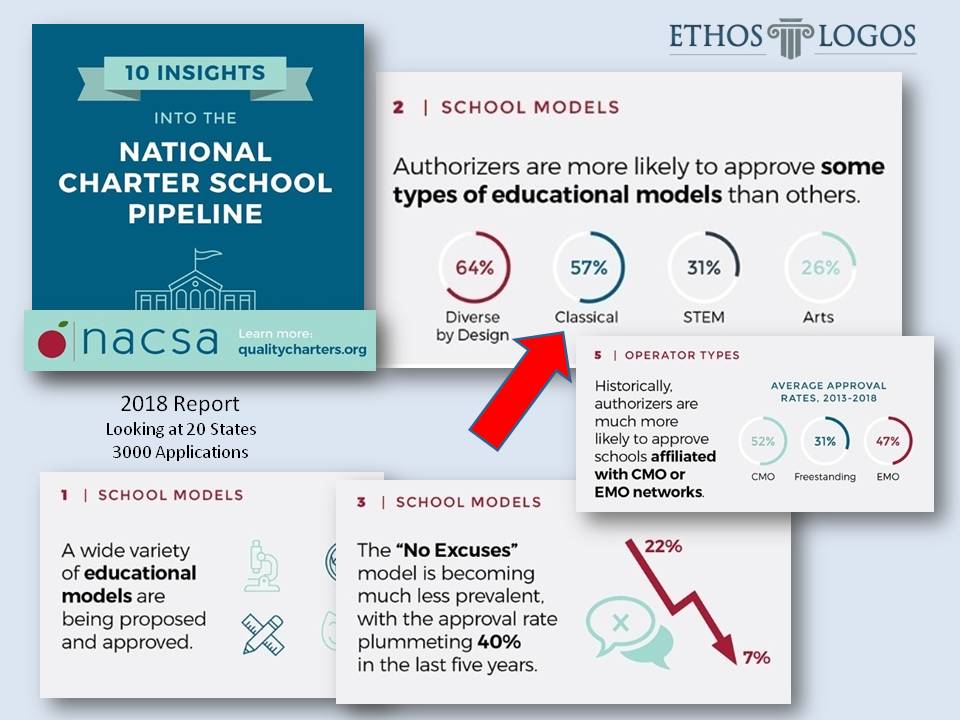
At Ethos Logos, our mission is to make the Classical Education model available to as many families in the US as possible. We have seen the benefits and believe we are at the beginning of a movement.
